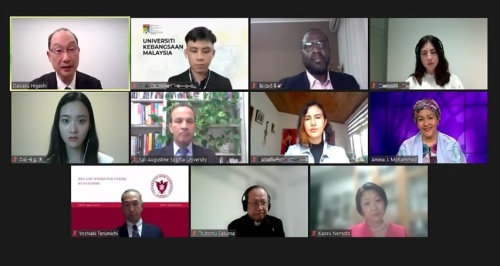
Sophia University in Tokyo hosted a special online lecture by UN Deputy Secretary-General Ms. Amina Mohammed on 20 October 2021. The title of the lecture was “Achieving Sustainable Development Goals (SDGs) and Realizing Youth Aspirations in a Disrupted World.” There were more than 1,300 registrants from all over the world, and about 800 students and citizens across the globe participated in the lecture.
The event was realized by the negotiation and coordination of Professor Daisaku Higashi of the Center for Global Education at Sophia University; Professor Higashi moderated the lecture and the discussion.
(You can see the video of the entire session in YouTube.)
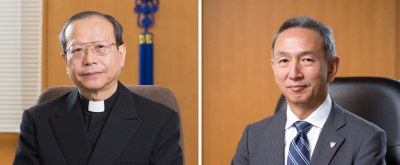
In his initial remarks, Professor Tsutomu Sakuma, Chancellor of Sophia University, mentioned that Sophia University hosted the lecture by UN Secretary-General Antonio Guterres in December 2017, and it is an extreme honor for Sophia University to host the lecture by the UN Deputy Secretary-General (DSG) this year.
Professor Yoshiaki Terumichi, President of Sophia University, also delivered initial remarks, emphasizing that this valuable opportunity to hear the voice of one of the top UN players should bring us closer to the many emerging challenges faced by the world today.
Ms. Kaoru Nemoto, Director at the UN Information Center in Tokyo, also made initial remarks: after stressing the global setback caused by COVID-19, Ms. Nemoto expressed her hope that “today’s symposium would provide us with encouragements to deliver on the promises of the SDGs.”
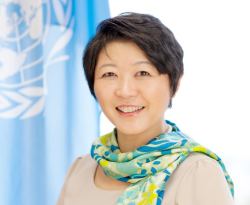
Special Lecture by DSG Mohammed
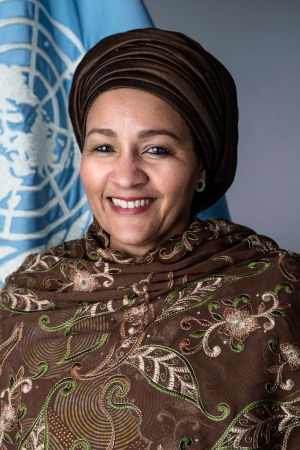
After an introduction, DSG Mohammed delivered her special lecture (To view her entire lecture and discussion with 5 students, click the link at the end of this article).
She emphasized that when she finished her studies in the 1980s, she also felt enormous uncertainty; “My country, Nigeria, was ruled by military dictators; Apartheid was the dark reality in South Africa; and women suffered from discrimination in all countries and all areas of life.” She stressed, however, that Nigeria became a democratic country, Apartheid was abolished, and now the UN Deputy Secretary-General is a woman.
Thus, she encouraged all students and participants to be “neither helpless nor hopeless.” She stressed, “together”, with the voices and engagement of young people, “we can and must find a way through.”
She argued that one of the reasons for the “hopefulness rooted in fact” is that “we have a compass: The 2030 Agenda and its 17 Sustainable Development Goals.” DSG Mohammed contended that these goals are “our practical blueprint for the world we want and need—a world of dignity, of solidarity, and opportunity for all on a safe and healthy planet.”
She admitted that six years after the adoption of the SDGs, “we are not on track to making the 2030 Agenda a reality, and the COVID-19 pandemic has pushed us further off course.” After stressing the challenges of COVID-19 and climate emergency across the globe, DSG Mohammed called for action in five key areas.
First, “we must muster up the solidarity and international cooperation required to end the pandemic everywhere.” DSG introduced the global COVID-19 Vaccination Strategy launched by the UN Secretary-General and WHO, which has a detailed plan of action to get vaccines into the arms of 70 percent of the world’s population by the middle of 2022. With vaccine production now at nearly 1.5 billion doses per month, “this is possible—but only if we ensure that distribution is equitable.”
Second, DSG Mohammed argued that we must safely expand social protection programs; she emphasized that 4 billion people, more than half the world’s population, need to have protection from poverty.
Third is to build resilience and reduce inequalities. “We must ensure that quality essential services are available to everyone; the pandemic revealed enormous inequalities in access to clean water, sanitation, energy, and key technologies.”
Fourth, DSG Mohammed stressed that “we must accelerate the shift toward carbon neutral, green societies.” It requires greater investments on multiple fronts. DSG contended that Japan’s leadership and innovation on climate action and disaster risk reduction is critical.
Fifth, DSG stressed that we must build new partnerships for sustainable development and commit to “leave no one behind.” We must help developing countries to mobilize their resources so that they can respond to the pandemic, relaunch their economies, and protect their people.
Finally, DSG Mohammed concluded her lecture by telling students and citizens across the world, “ambitious action in these five areas today can get the world back on track and secure a better world for all tomorrow. We have the means and the knowledge. What we need is the political will.”
She again stressed the importance of the engagement of young people; “one country can and does make a difference. Indeed, one person can start a movement that makes a difference.” DSG Amina Mohammed urged all participants to continue to raise their voices.
Discussion with students
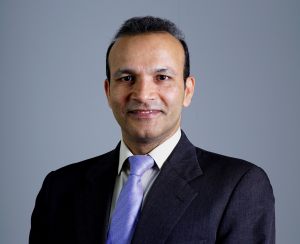
After the lecture by DSG Mohammed, Professor Sali Augustine presented his comments and raised two questions: first, how the damage caused by the corona pandemic will affect the goal setting itself in 2030. The second question was how to reconcile the dark sides of SDGs: their numerous measurements and goals, which might make it difficult to focus on urgent needs.
Then, five students were invited to ask questions of the DSG. A student from Malaysia asked a question on inequality of internet access and its critical impact on the inequalities in education, based on the lack of access to the internet in some rural areas in Malaysia. A student from Spain asked a question on rapid demographic changes, especially aging societies in developed countries, and how the younger generation should face this critical problem.
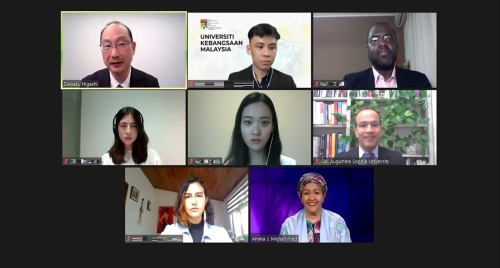
A student from Liberia in Africa asked a question about military coups in Africa, which delayed or stopped democratic processes. A student from Colombia asked how the UN can protect social environmental activists when many of them have been murdered by gangs, reflecting the situation since signing the peace agreement in Colombia. Finally, a Japanese student from Sophia University asked a question on how to address child labor in third-world countries.
DSG Amina Mohammed responded to these questions and comments very thoughtfully and passionately. All students were very happy about the active online discussion and engagement with the DSG.
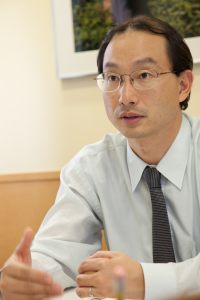
After moderating the Q and A session, Professor Higashi concluded the event, emphasizing that just two years ago, it was beyond imagination to host an online session between the UN Deputy Secretary-General and more than 800 students and citizens participating from all over the world to discuss the global challenges that we all are facing.
Thus, “it is getting technologically possible for us to get together and exchange opinions across the globe”; the question is how can we act together. In that sense, he sincerely appreciated DSG Amina Mohammed for her commitment and great engagement with students across the world to discuss the global challenges. DSG Mohammed also appreciated the event and called for the younger generation to continue to engage with global issues and to seek solutions.